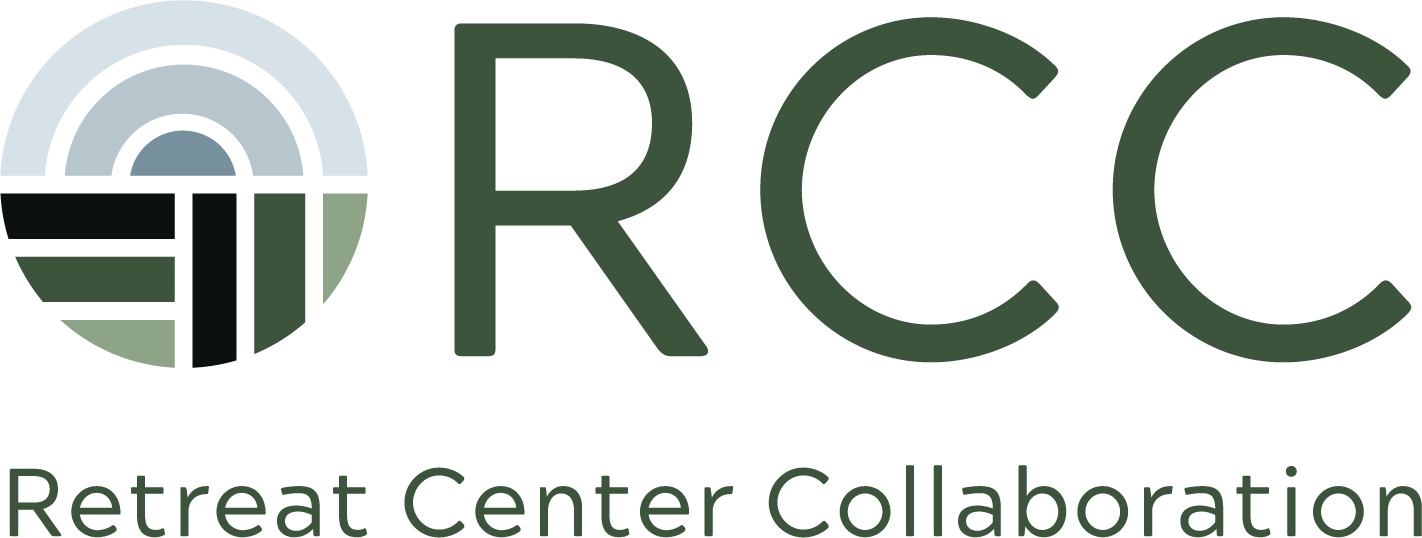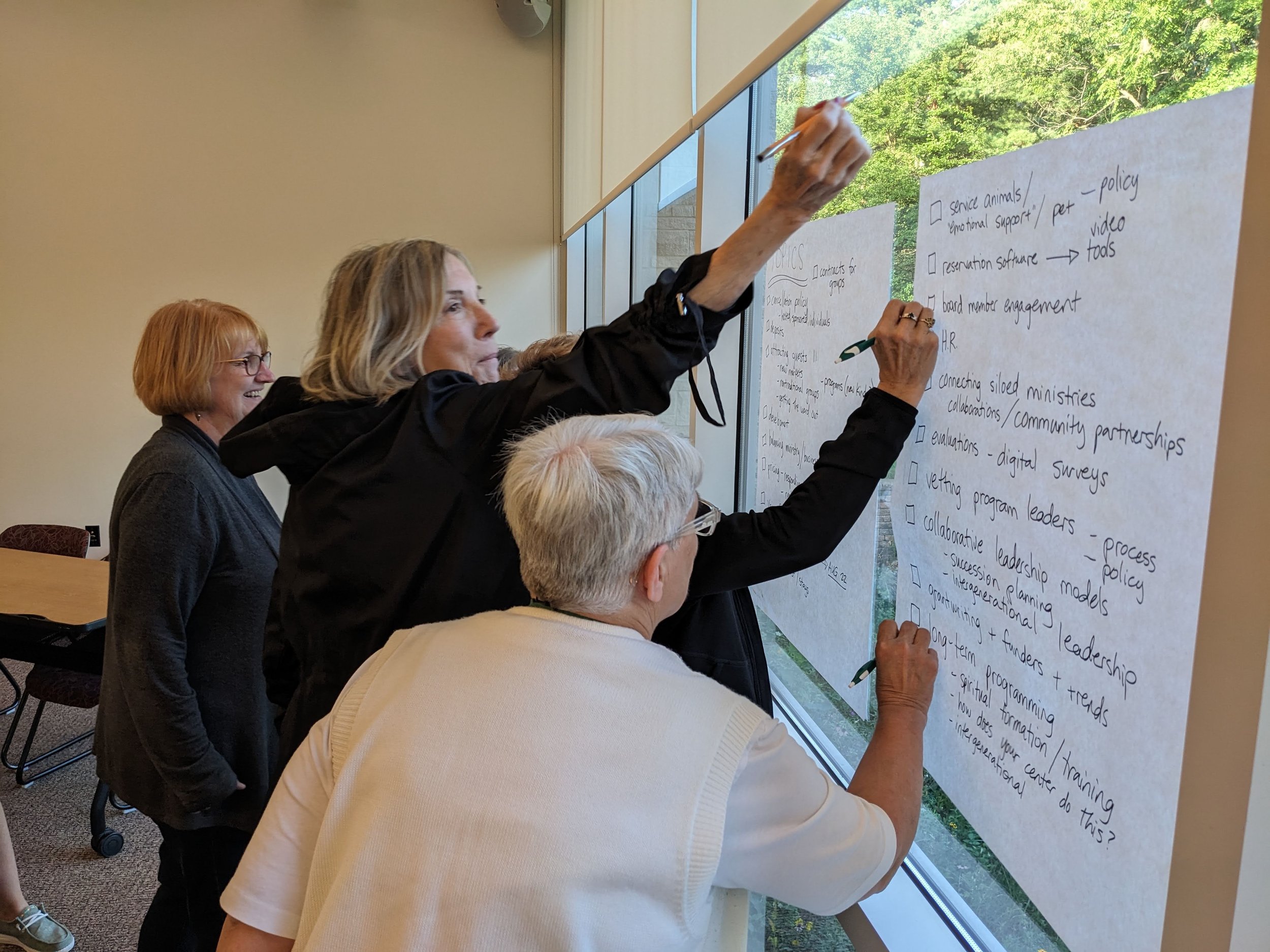The Joy of Gathering With Regional Peers
A big-hearted pick-me-up
Retreat center leaders from across the Midwest United States have been gathering regularly as an affinity group during the past year. This group serves as a big-hearted pick-me-up for folks who often feel isolated in their work, and an invitation to celebrate being surrounded by people who understand and share a similar vision and set of challenges.
Quarterly meetings are an opportunity to exchange information and best practices. It’s also an experiment in some ways, as the group learns about itself and what is possible. What do our centers have in common? How could we collaborate? What can we learn from the work being done by our peers?
How it works
Facilitated by a handful of volunteers who are retreat center leaders themselves, the Midwest Centers Affinity Group meets virtually to offer each other peer support on a variety of topics like marketing and programming. Using a collaborative approach, RCC staff members provide coordination for the schedule of quarterly meetings, and promote upcoming meeting topics to the larger community, then step out of the way so the group can be facilitated by peers. Although each participating center is unique in terms of size, staffing, and programming, it’s been pretty easy for participants to talk shop together and compare notes, in part because they share a common region.
Gathering in person
Within a few months of their first conversation, group participants began to express a desire to gather in person at one of their centers for more in-depth discussion and connection, and to exchange the experience of retreating in a new environment. Thanks to the generosity of Lindenwood Retreat Center, a ministry of the Poor Handmaids of Jesus Christ, the group held a two-night retreat in northern Indiana on August 15-17, 2023. Lindenwood hosted 16 participants at a deep discount, in the hopes that this inaugural gathering of leaders would be successful enough to encourage other centers to host in the future.
Group activities
The agenda for our gathering was fairly informal. We identified our emergent priorities for topical discussions by listing them and voting as a group, using this process as a springboard for further discussion. It was great for us at RCC to witness the collective energy in the room during conversations on wide-ranging topics such as reaching new retreat audiences, establishing clear cancellation policies, comparing notes on scholarship applications, and comparing accommodation offerings and pricing. We took notes.
The rest of the time was dedicated to connecting socially in one-on-one conversations, taking some time for creative solo reflection at MoonTree Studios, participating in optional prayer services, and gathering for shared meals. We also toured the campus, learned some local history, and discussed some of the unique opportunities for cross-program collaboration that Lindenwood’s ministries are exploring between the local college, art studio, farm, assisted living center, chapel, and grounds. There wasn’t a lot of downtime for rest and renewal, but we did enjoy a pontoon boat ride and an evening bonfire together.
What have we learned?
The midweek schedule made the event easier to attend for retreat leaders who are often booked on the weekends.
Participants want a crisp agenda ahead of time, to help plan their time.
Participants expressed a desire for more formal session facilitation, as well as more opportunities for informal social networking and professional development training at gatherings like this.
Comparing notes on the basics is helpful. We can exchange cancellation policies and scholarship applications in shared spreadsheets, and we invite other centers to add links to their forms! We can also share policy and application template files by uploading them to this shared folder.
Experiencing another center as retreat participants brings up some “aha!” moments for retreat center leaders, and expands our awareness of what might be possible. For example, a farm-to-table meal on the final day of the retreat highlighted the potential for more centers to design retreat programming that includes environmental stewardship practices and possibly hands-on participation in farming or gardening work.
Looking ahead
The Midwest Centers Affinity Group is a great example of an emerging regional cohort within the Retreat Center Collaboration community. Regional cohorts are a new way RCC is learning to serve community members, and we look forward to applying what we’ve learned so far in our work with additional regions and communities. Because RCC is in contact with over 150 people working at retreat centers in the Midwest, there’s much more to discover. We’re excited to see what comes out of this network weaving as our relationships deepen. Stay tuned!
More resources
RCC's public Google Drive is available for you and your team. We invite you to check out all the reports, survey data, and information from a variety of RCC groups, collaborations, and conversations. Many of these files and folders are open to anyone to edit. Please share your knowledge with our peer community!




